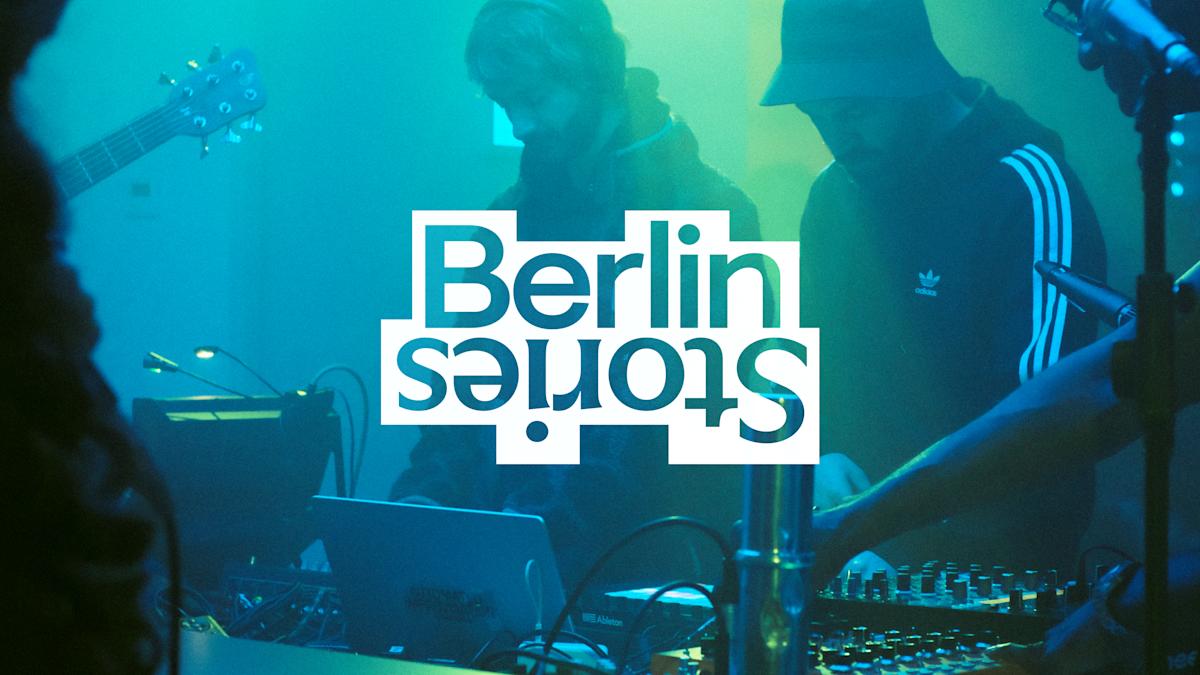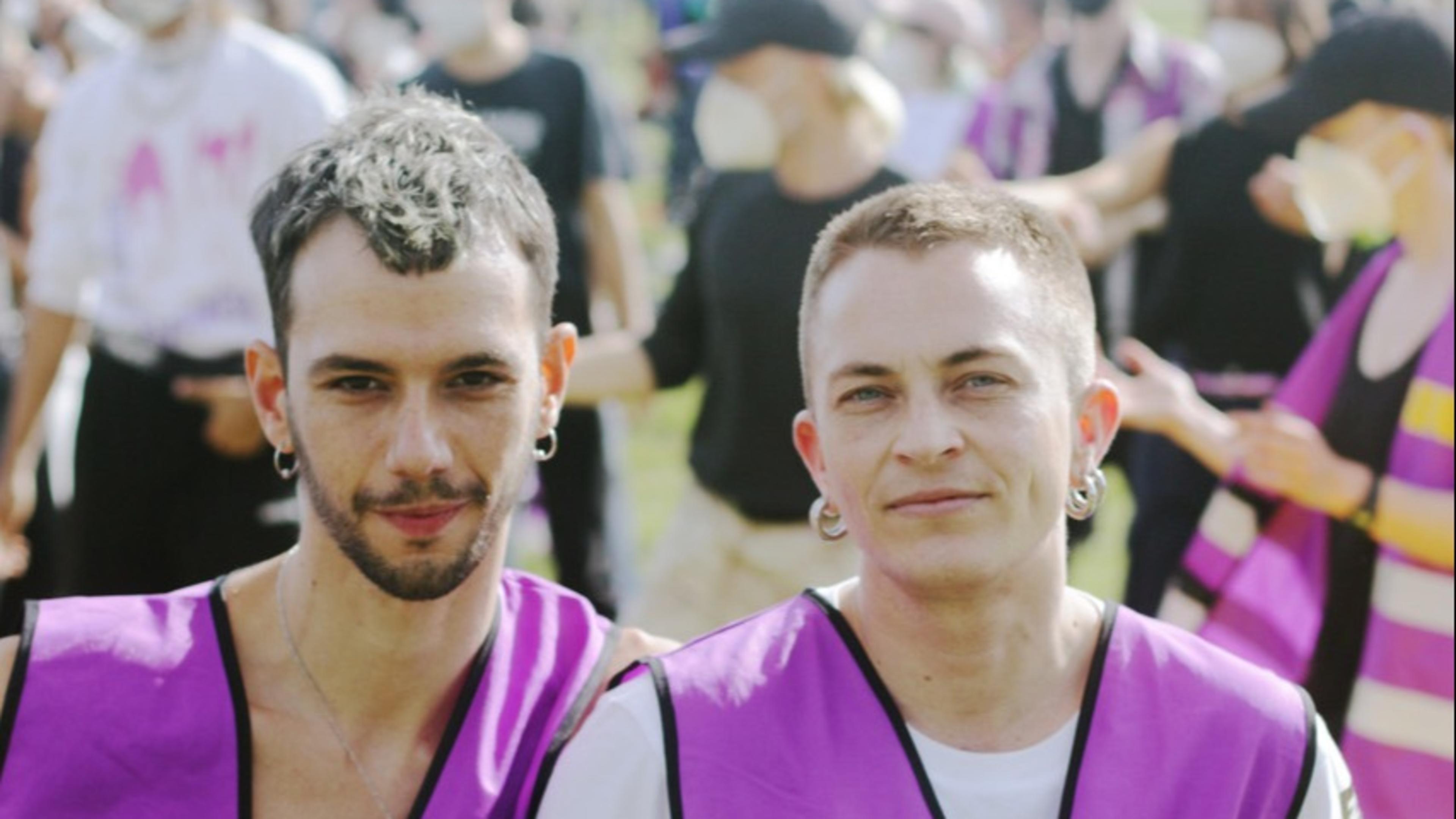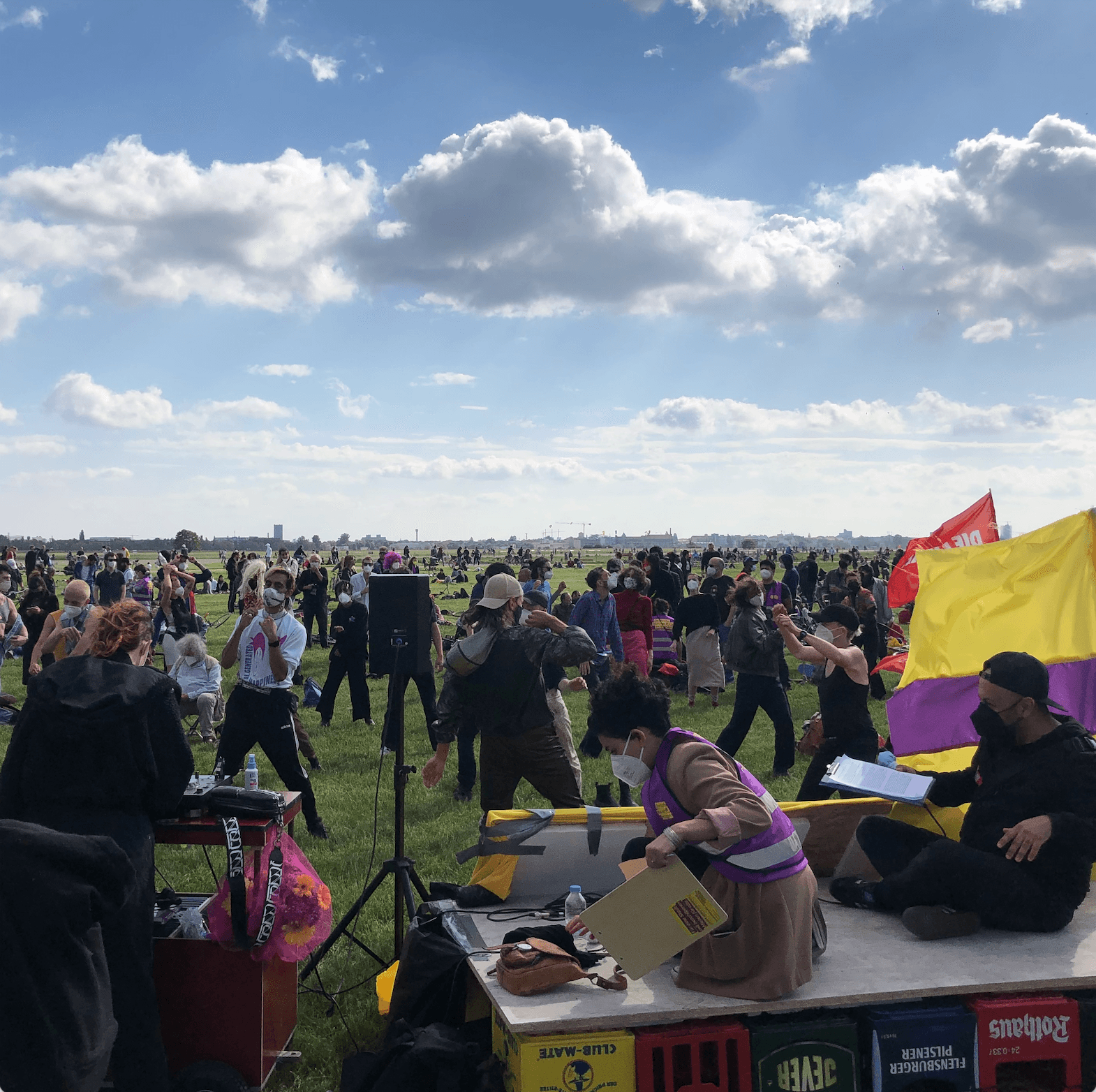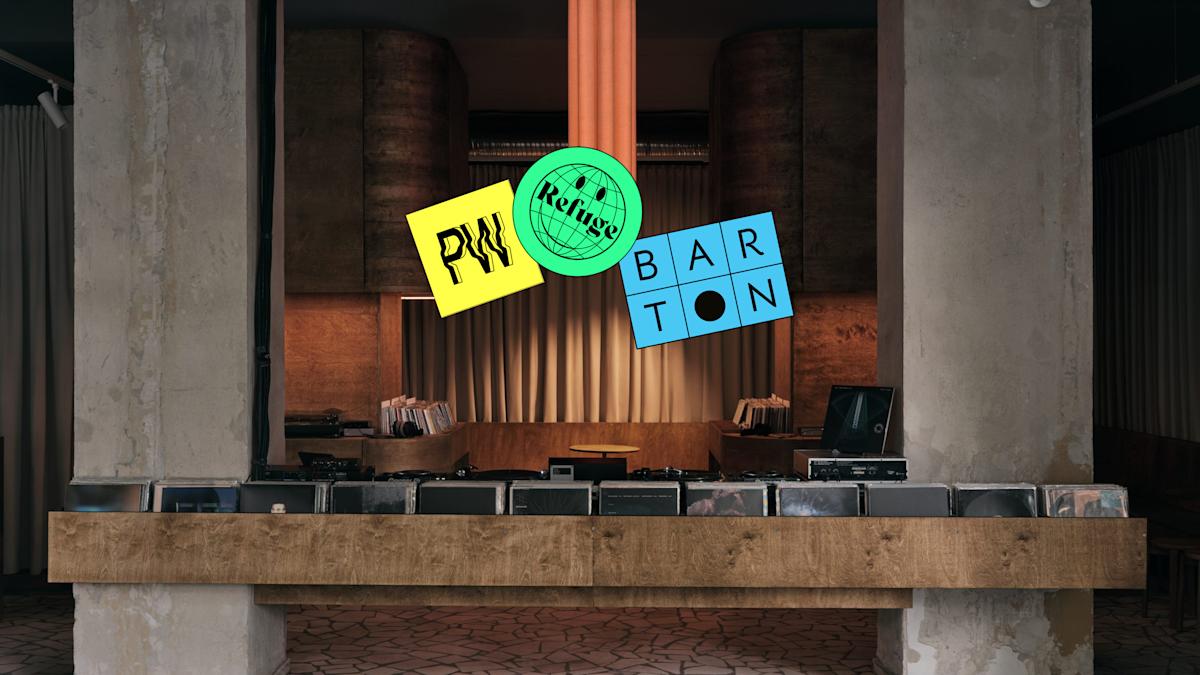
Berlin Stories
This week: Black history month, fusion soundscapes, soli kufa
Loading

Pedro Marum and Lou Drago explain the criticality of giving non-citizens a say in city housing issues.
By Steindór Jónsson
Expats in the Deutsche Wohnen & Co Enteignen campaign are calling for immediate action to control housing prices.
While rents skyrocket in Germany’s capital and laws that protect the financial interests of low-income residents, like the Mietendeckel—a city-wide rent cap in operation between November 2020 and April 2021—are reversed, the campaign Deutsche Wohnen & Co Enteignen (which translates to "Expropriate Deutsche Wohnen & Co) is petitioning local authorities to socialize a large portion of the city’s residential housing. Their plan? To re-claim privately owned apartments from Germany's largest real estate companies—Deutsche Wohnen, Vonovia, and Akelius—and use them for public benefit.
Pedro Marum and Lou Drago, pictured, are two Berlin-based artists and DJs who are involved in a working group within the Deutsche Wohnen & Co Enteigen campaign called Right to the City for All. The group is shedding light on how a large portion of Berliners, namely migrants and non-citizens, don’t have the right to vote or have their say in petitions. The group argues that the housing market is an area that breeds discrimination and racism, and that migrants face additional struggles making their voices heard within the current system.
They’ve both been active in the city’s queer feminist nightlife scene and organized the XenoEntities Network (XEN), a platform for discussion and experimentation focusing on queer, gender, and feminist theories and their intersections with science, digital technologies, and collective futurities.
The campaign must deliver 180,000 valid signatures by June 25 to have the referendum voted on in September. While the campaign has already collected more than the requisite amount of signatures, many will not count as the signatories don’t have German citizenship or Berlin residency. We sat down with Marum and Drago during their rally in Tempelhofer Feld on May 29 to discuss how they’re mobilizing more supporters and overcoming obstacles for migrants, queer people in the nightlife industry, and low-income visa-holders.
Note: This interview has been condensed and edited for clarity.
How did you get into working with Right to the City for All? I know a lot of non-citizens in Berlin are hesitant to get directly involved with politics.
Lou Drago (LD): A lot of people want to join a campaign but don’t know how to access it. There are many people in our campaign who don’t speak German but are able to participate and collect signatures. We did a little push last week to collect signatures in Hasenheide park. We were a bit tentative to do it, as we’re not very confident German speakers. But we realized very quickly that you can do quite a lot with limited German. We went with a couple of German-speaking friends who helped break the ice, but with my broken German i* could still communicate something to people.
Pedro Marum (PM): Up to 30 percent of the signatures we have may not be valid. The vast majority of those are from people who live in Berlin but don’t have a German passport.
LD: One of the main targets of our working group is to scandalize the fact that about 22 percent of the people who live, work in, and contribute to Berlin don’t have a right to vote in this referendum.
* Drago prefers the use of a lowercase “i” as a rejection of privileging the self above others (i.e. “he,” “she,” “they,” etc. which are all uncapitalised).
How do you split your time between art and activism? They seem pretty intertwined in your respective work.
LD: It’s really difficult to define what activism is, but i personally define it as organizing, not just posting nice things on Instagram. Spreading awareness and raising consciousness is a very important element, but i don’t think that’s enough to be called activism. i’ve put a lot of my artistic work on hold to involve myself in the campaign. It’s always a work in progress to not spread myself too thin.
PM: I come from the south of Portugal and moved to Lisbon where I studied in the health field and also worked on issues tied to social justice and gender politics. At the same time, I started running a project with a collective that was sort of a cultural platform focused on music and performance. That’s how I started working in this intertwined field of arts and political discourse, while making activism exciting. We found that it was difficult for a lot of queer people to get into politics, because they wouldn’t see themselves represented or found it difficult to penetrate groups of people that did not share the same perspectives. As the collective grew, we tried to create bridges between social justice projects that existed in the city and host events that raised money for projects, like creating a refuge for trans and queer kids and helping people who need housing or medical care.
I also started running a project called mina, which is a queer electronic music collective that operated under very precarious conditions. When we started, Lisbon was changing to accommodate more tourism to curb the massive debt Portugal had accumulated. Lisbon changed very drastically and our group was one of the flag holders of the resistance to this change. The rents were soaring to the point that people were paying half the minimum wage for housing. This is how I started working more with these topics, as Lisbon was like a laboratory for what tourism can do.
I moved to Berlin, but one of the things I missed was my capacity to engage with local politics. Our work with XenoEntities is fairly focused on social justice, but there’s always a disconnection with local activism that operates mostly in German. So I learned about this movement, Deutsche Wohnen & Co Enteignen, and particularly the working group Right to the City for All, in the middle of a pandemic when so many artists saw themselves impoverished and realizing just how difficult it is to navigate the housing market.
What was your personal experience when you moved here and tried to find an apartment?
PM: I’ve been fairly lucky. I already knew some people and they helped me find a place. During the pandemic I realized how important it was for me to get a rental contract and I ended up managing to get it with help from friends, but it wasn’t easy.
LD: i moved into my first apartment about seven years ago with two friends, and we got it relatively easily. But after moving in we realized it was a big scam; it was overpriced and they were taking advantage of us. We had to join in with our neighbours to get them to fix the heating for two consecutive winters. It wasn’t until we withheld the rent that they fixed anything. After that i bounced around from sublet to sublet without finding a place of my own. I couldn’t get an Anmeldung [residence registration with the local authorities]. The whole Anmeldung process is so exclusive and complicated for many people.
My friend and i applied to over 60 places. It was like a full-time job. I was unemployed at the time and my friend was studying. Every single day we applied and mostly never got a call back. We finally got a place where we had to lie and say we were a couple because the place was much too small for two people, and we had to say that we’d share a room. I think because we presented like a gay couple and the apartment was in Schöneberg, a gay-friendly neighbourhood, we had an advantage. We needed to fake documents to show we were earning more money than we were. It shows how difficult the situation is. You turn up and there’s a line down the stairs and into the street, with 500 people looking at one apartment.
There’s a website that shows based on your income which areas in Berlin you can afford to live in, and it’s really scary, because basically we can’t afford to live anywhere in Berlin, not even in the outer suburbs.
So it seems like it’s mostly through friends and connections that you’re able to navigate this.
PM: In that sense I’m fairly privileged. We hear so many horror stories about people who literally move flats once a month. This is a mechanism that hinders the capacity for migrants to thrive when they already face so many obstacles, not only with the language but with the bureaucracy, with being away from their country, and having to spend a lot of their time constantly searching for housing. I think this is something that Right to the City for All is sensitive to, even though many of the German activists have never faced this.
What are the specific housing issues migrants face?
LD: When many Germans think about migrants moving to Berlin they may think of the wealthy tech-worker, English trust fund kid or students who have support from their parents. i don’t get the impression that they think about those who struggle to access the system. Many of them work in service industry jobs. Most migrants aren’t here trying to gentrify the city.
PM: I’ve become aware of how many nativist policies are in place in this country. In Portugal, when you need to apply for something, there is a culture of accommodating people who don’t speak Portuguese. You can get a translator or paperwork that is already translated into another language. In Germany there is a strong nativist structure that forces institutional workers to speak German, and I think it hinders people from accessing the mechanisms that are already in place to assist renters. It might take you a while to discover that these things exist and that you can get help.
LD: Migrants are very often the ones with newer contracts with a higher price. I’ve talked to many migrants who had to repay a lot of money because of the Mietendeckel repeal [the rent control law that was struck down by a constitutional court]. My rent was going to be €300 lower, but luckily i have a German friend who advised me to put the money aside every month and not spend it in case of a repeal. We luckily had the money to pay it back, but for many people in the middle of a pandemic they couldn’t put it aside. They’re now stuck with thousands in bills.

Do you think the arts scene in Berlin has a responsibility to take a stand on these issues?
PM: Absolutely. Especially the electronic music and nightlife scene. It’s an industry that generates millions in revenue to the city and is a big part of tourism in the city. And yet, a lot of the artists that are putting in the labor to develop the scene don’t see a lot of these profits. People working in nightlife are often in precarious situations, whether they’re sex workers, drug dealers, or artistic performers. It’s an industry that still lacks a lot of protection despite being so beloved and hailed as one of the most fantastic things in the city. We work specifically in the queer nightlife scene, and although the city may seem welcoming to queer people, a lot of the landlords are not and may see us as some sort of pestilence on the city.
The clubs are also being shut down, making way for co-working spaces and tech workers who are ironically moving to a city that they perceive as cool and having an exciting global clout. Their higher incomes create a gap between the people who work in the nightlife industry and the consumers who are maybe unknowingly contributing to our evictions. We’ve seen so many clubs close in the last few years.
LD: i’d rather play for no one! I definitely think the cultural sector should be responsible, but i think that everyone has a stake in saving Berlin. The gentrification that is happening is so rapid that i’d like everyone to feel responsible. It’s a process that’s always going to happen, but which type of gentrification do we want and at what pace? And what kind of protections are going to be in place for those affected? If it keeps going at this rate the city will end up inaccessible for the people enjoying it now.
If the campaign is successful and the referendum takes place, what would you like to see as the outcome? What is the best case scenario, and what would you accept as a positive short-term solution?
PM: One of the goals for me was already achieved: to get a lot of people talking about the issue. The campaign has a big presence in the streets and in the media. People know about the campaign, and the repeal of Mietendeckel ironically gave us a lot of visibility. Now Vonovia is buying Deutsche Wohnen and I think both the real estate speculators and the politicians know that people are not happy. I hope we get enough signatures, but it will be hard. The Mietendeckel story has shown how easy it is to take away small comforts like having a slightly lower rent. I just hope that the conversation will be elevated and I’m happy that the club scene is also talking about it. It’s really exciting to see a movement that unites so many different people.
LD: Pedro sounds optimistic, and i’ve definitely had beautiful moments of feeling that too. But the fact that Vonovia can buy Deutsche Wohnen now really demonstrates to me that they’re not scared at all. Why would you buy more apartments if you think they’ll get expropriated? I think the state doesn’t care too much about the public and has been protecting these private interests. But what is amazing is all the activists on the street collecting signatures, working behind the scenes to make this campaign happen and how there are posters everywhere. It’s one of the biggest and most diverse campaigns i’ve seen in my time in Berlin. But we’ve also run into many people who are against the campaign.
How do you find the power and passion to keep going, both with the campaign and your own work as artists? A lot of people feel hopeless right now and don’t feel like they can get anything done, creatively or politically.
LD: The moments that give me hope are when we can do things collectively. Other people give me hope. We don’t have other cities or places in the world to look to. The whole world is suffering under the hands of extractive capitalism. We only have the hope of imagining a better future.
PM: It’s been a difficult year for many of us, but our adversities have become our biggest source of inspiration. Some people are not doing well, but others have the capacity to raise morale. We’re also reminded of our privilege and of what we have: living in Germany where there was some financial support through the pandemic, while there are many people in desperate situations. We’ve managed to still accomplish some exciting artistic projects amid this chaos. Almost like raving in our own ruins. We have no parties, no galleries, no gigs, but we’re still doing what we can.
Photo © Roberto Duarte.
Find out more about Right to the City for All on their website. You can follow Pedro Marum on Instagram here, and Lou Drago on Instagram here.

This week: Black history month, fusion soundscapes, soli kufa

A screening, conversation, and live performance at Niemetzstraße 1.

Refuge Worldwide residents head to Romania.